| items per Page |
|
| Table of Content |
| Customs of Liyue: Flower Ball |
| Customs of Liyue: Receiving God |
| Customs of Liyue: Silk Flowers |
| Customs of Liyue: Glaze Lilies |
Customs of Liyue: Flower Ball
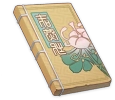
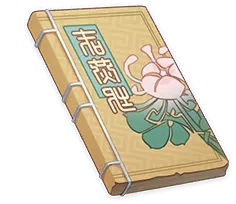 | Name | Customs of Liyue: Flower Ball |
| Type (Ingame) | Quest Item | |
| Family | Book, Customs of Liyue | |
| Rarity | ||
| Description | A book on the cultures and customs of Liyue originally compiled by Fadhlan, a scholar from Sumeru residing in Liyue. It was then edited by many local scholars and published. It is one of the bestsellers in Liyue. |
| —Flower Ball— It is customary at weddings in Liyue for the bride to cast a flower ball towards the oncoming crowd of guests. It is said that the one fortunate enough to catch it will enjoy a year of good luck: business owners will see their wealth increase, the poor will see their fortunes turn around, the single will encounter their fated partners, and the married will see their shared life blossom with mutual love and appreciation, never again to descend into petty squabbles over life's daily vexations. While some brides use a real flower ball, many alternatives exist depending on the family's wealth. The rich tend to use woven balls with silk from the Silk Flower, while the poor fashion theirs from colored paper or cloth. But the custom itself is observed in the same fashion at all of Liyue's weddings, even though the fortunes of individual families may differ. Some say the Liyue custom was originally adopted from the Ludi Harpastum festival celebrated in the neighboring Wind Kingdom of Mondstadt. Others say it dates back to before the Archon War when the Salt God roamed free in Liyue. She once stood shoulder to shoulder with the many gods of Liyue, but her extraordinarily gentle nature saw her quickly ousted in the hubris of the Archon War, before being ruthlessly murdered by one of her own followers. Her remains are likely to be found somewhere in the ruins of the area known as "Sal Terrae." According to a legend that time has unfortunately stripped of all useful detail, she once handed out bunches of flowers to her people as a blessing to them. Or at least, if not a blessing, then a small gesture of comfort to stave off the bitterness of wartime existence. In any case, following her return to the elements, it is conceivable that her followers spread across Liyue, took this custom with them, and taught it to the locals. The people of Liyue being a competitive and fun-loving folk, they may then have adapted it and embellished upon it to suit their own preferences. Despite being a benign and joyful celebration at heart, security logs from the Millelith indicate that the throwing of flower balls is responsible for a significant number of injuries every year. In fact, the number of cases is more or less the same as those caused by monster attacks. |
Customs of Liyue: Receiving God
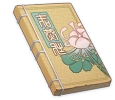
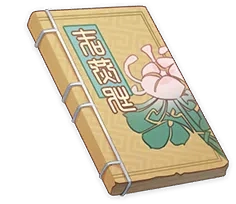 | Name | Customs of Liyue: Receiving God |
| Type (Ingame) | Quest Item | |
| Family | Book, Customs of Liyue | |
| Rarity | ||
| Description | A book on the cultures and customs of Liyue originally compiled by Fadhlan, a scholar from Sumeru residing in Liyue. It was then edited by many local scholars and published. It is one of the bestsellers in Liyue. |
| —Receiving God— Of all the celebrations, ceremonies, and customs of Liyue, none is more iconic than that held in reception of their god: the "Rite of Descension." It is during this rite that the Geo Archon, Liyue's deity and watchful guardian over the ages, descends in person upon the mortal realm to issue his divine proclamations and exhort the people to be guided by the wisdom they contain, so that all things may transpire in accordance with established rules instead of tending towards chaos. In the earliest and humblest days of Liyue's history, Liyue's farmer-forebears would elect community representatives to greet the Geo Archon on arrival and give him an appropriate send-off on departure. After making lavish offerings and reciting solemn blessings, they would listen in reverence to their god's divine predictions before announcing to the people the vision for their labor in the year ahead. In this way, mortals were guided along the path towards prosperity and to triumph over the obstacles that lay in their way, and thus did the domain of the Geo Archon remain strong and steadfast. When peace returned once more after the Archon War, the city of Liyue Harbor began to flourish under the government of the Qixing, who represented every trade in Liyue, and who also acted as intermediaries between mortals and their god, taking responsibility for communicating with the Geo Archon, explaining his divine predictions to the people in clear and simple terms, and issuing the official policy for the forthcoming year. Naturally, the illustrious individual tasked with hosting the Rite of Descension can only be chosen from among the Qixing, and no one other than that person is permitted to intervene in the proceedings. In the minds of the many merchants of Liyue Harbor, the divine predictions of Rex Lapis are more precious than the metals and minerals of the mountain mines. Thus, no matter how far from home they may have strayed by the day that Rex Lapis descends, all will seek to make the journey back in person, or at least send someone in their place, so that they may receive the guidance of the Geo Archon and safeguard their financial fortunes for the year ahead. The raving-mad sages of the nation of rainforests drive themselves to hysterics as they abandon all that is worldly in their pursuit of elusive and esoteric wisdom, but the people of the land of karst cliffs are accustomed to welcoming the generous guidance of their deity as a means towards a worldly end — namely, their continued prosperity. It would seem that, while The Seven stand shoulder-to-shoulder in their roles as Archons of the mortal realm, there are moments where their paths diverge and even run directly counter to one another. |
Customs of Liyue: Silk Flowers
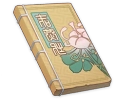
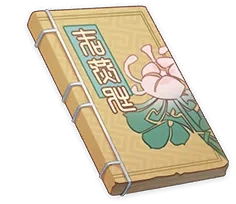 | Name | Customs of Liyue: Silk Flowers |
| Type (Ingame) | Quest Item | |
| Family | Book, Customs of Liyue | |
| Rarity | ||
| Description | A book on the cultures and customs of Liyue originally compiled by Fadhlan, a scholar from Sumeru residing in Liyue. It was then edited by many local scholars and published. It is one of the bestsellers in Liyue. |
| —Silk Flowers— For the well-to-do citizens of Liyue, the Silk Flower has a ubiquitous presence in their lives: It has a beautiful color and its soft petals can be processed to make silk. It also has a most delightful scent that can survive multiple rounds of processing, and even the weaving process itself. For this reason, Liyue's botanists have cultivated a special strain for exclusive use in perfume making — with the most luxurious perfumes being offered first and foremost, of course, to Rex Lapis for his approval. For the women of Liyue, highly prized Silk Flower perfumes are seen as holding different symbolic meanings based on the fragrance profile and composition. The unwritten rule in Liyue is that it is impolite to broach the topic of perfume with a woman in normal social interaction, but also that if an admirer is able to correctly guess the type of perfume one is wearing, as well as correctly deduce its unique properties and characteristics, all whilst conveying this in an articulate and tactful manner, the admirer is more likely to stand a chance of winning one's affection. A popular belief in the rural regions of Liyue is that the method for decocting Silk Flower perfume was originally taught to mortals by an adeptus living as a hermit on Mt. Aocang. In the age where divine beings coexisted alongside lowly mortals, the adeptus guided humans to learn the ways of courting and romancing from the birds, beasts, and plants. To a young woman bathing in a spring, it once took the form of a graceful illuminated bird, teaching her the exotic techniques of decocting and applying fragrant oils. Who was this young woman capable of stirring the heart of an adeptus living in deliberate seclusion from the world? With countless legends offering different versions of the story, the truth is impossible to know. But the art of decocting perfume from Silk Flowers was indeed passed on, for it survives to this very day. It is claimed that the subtle undertones of the perfume's scent and the gentle-but-nimble hand techniques used in the decoction process have remained unchanged throughout history on account of having proved themselves supremely fit for purpose time and time again. As they grow, Silk Flowers will exhibit different properties based on how their environmental conditions differ from their ancestral habitat. Liyue's merchants have coined plenty of tasteless terms for Silk Flowers of all types and uses. They tend to attribute them to Rex Lapis, claiming they once had the fortune to encounter him during one of his excursions in the mortal realm or pass them off as a merciful gift from an adeptus, such details always featuring as part of a wondrous, fantastical narrative. Sales tactics like these always manage to garner the interest of a shopper or two on their way through Liyue Harbor. High demand has pushed Liyue's merchants towards the mass cultivation of Silk Flowers and the ongoing breeding of new strains. This means that the striking sight of beautiful Silk Flowers is a common one in all highly populated areas, including the city and the towns. Sadly, geographical changes over Liyue's long history and ever-expanding mining activity have conspired to destroy the natural habitat of wild Silk Flowers, meaning that the flower is all but extinct in rural areas. The handful that can still be found in the wild are carefully looked after by adepti living in seclusion there. These Silk Flowers feature daintier, more elegant blossoms, which puts them in stark contrast to those cultivated by horticulturalists in urban centers. Interestingly, the people of Liyue see the pretty and sweet-smelling Silk Flower as one of the many symbols of Rex Lapis. Which begs the question: Has this mighty and imposing god, who typically takes a decidedly masculine form on his excursions to the mortal realm, ever taken the form of a woman and accepted a ritual offering in the form of a bunch of flowers? The sparse historical records on the one hand and the plethora of rumors of obscure origin on the other means that, while this claim is more or less impossible to verify, it also cannot be simply dismissed as baseless speculation. On a personal note — the writer has, on one occasion, personally witnessed a Statue of The Seven accept a carefully prepared and distinctly feminine gift that was presented to it in worship. As for the Geo Archon's innermost feelings upon receiving offerings from their subjects, however, this is not something that I, as an outsider in Liyue, consider myself qualified to comment on. |
Customs of Liyue: Glaze Lilies
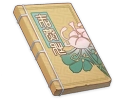
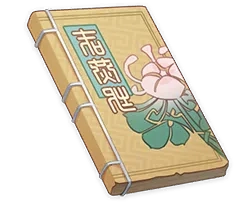 | Name | Customs of Liyue: Glaze Lilies |
| Type (Ingame) | Quest Item | |
| Family | Book, Customs of Liyue | |
| Rarity | ||
| Description | A book on the cultures and customs of Liyue originally compiled by Fadhlan, a scholar from Sumeru residing in Liyue. It was then edited by many local scholars and published. It is one of the bestsellers in Liyue. |
| (Test) |




无